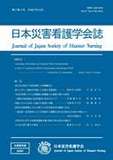Japanese
English
- 有料閲覧
- Abstract 文献概要
- 参考文献 Reference
要約
本研究の目的は、施設に勤務する看護職者が東日本大震災の被災地で支援活動した実態および、支援活動に出した施設が看護職者に対してどのような支援を行ったかの実態を調査し、被災地で支援活動する看護職者に必要な支援の示唆を得ることである。研究方法としてA看護協会に登録している施設685施設の看護部門責任者に質問紙を郵送で配布し調査した。調査内容は、施設概要や東日本大震災で活動した看護職者の派遣形態、活動内容、看護職者への支援に関する項目で構成した。その結果、278施設(40.6%)からの回答を得た。東日本大震災で看護職者を派遣したと答えた施設は78施設(28.1%)あり、派遣形態別では災害支援ナースを出した施設が20施設、設置主体からの要請で看護職者を派遣した施設は36施設、DMATは20施設、その他、例えば被災地からの要請や病院独自の災害支援チームなどで派遣した施設は14施設であった。ボランティアをした看護職者がいると回答した施設も36施設であった。活動場所は避難所が最も多く、救護所、居住地への訪問など多岐にわたっており、活動内容は様々であった。支援については、ボランティアナース以外の看護職者は、各施設で様々な支援を受けていた。しかし帰施設後のメンタルサポートを全く計画しなかった施設もあることなどが明らかになった。そのため、災害支援活動後のメンタルケアについて今後検討していかなければいけない。また、様々な要請で被災地へ看護職者が派遣されている事から、実際に支援活動した看護職者の体験をもとに継続した災害研修をしていかなければいけない事が分かった。
This study investigated support provided by nursing professionals in areas affected by the Great East Japan Earthquake and support provided for nursing professionals by their home health care facilities. Feedback on necessary support for such nurses was also elicited. Questionnaires were mailed to 685 Nursing Association-registered health care facilities. Survey items included information on facilities, types of dispatch, support provided by nursing professionals in disaster-affected areas, and support provided by home facilities to nursing professionals. A total of 278 facilities (40.6%) responded, with 78 (28.1%) stating that they had dispatched nursing professionals to affected areas. Dispatch types involved disaster-relief nurses (20 facilities), nursing professionals as requested by volunteer centers (36 facilities), nurses as members of the Disaster Medical Assistance Team (20 facilities), and nurses as requested by affected areas or as members of hospital disaster support teams (14 facilities). Thirty-six facilities stated that their nurses had worked as volunteers in disaster-affected areas, providing support mostly at evacuation centers but also at emergency medical centers and at the homes of those affected. Various types of nursing support were observed, and nursing professionals other than volunteer nurses received various forms of support from their home facilities. However, some facilities did not provide any emotional support for nurses returning from disaster-stricken regions, suggesting the need for development in this area. The results also revealed that many nursing professionals were dispatched in response to requests from affected areas. This indicates the need for continued provision of disaster training opportunities to nurses based on the experience of nursing professionals engaged in support activities in affected areas.
Copyright © 2015, Japan Society of Disaster Nursing All rights reserved.


